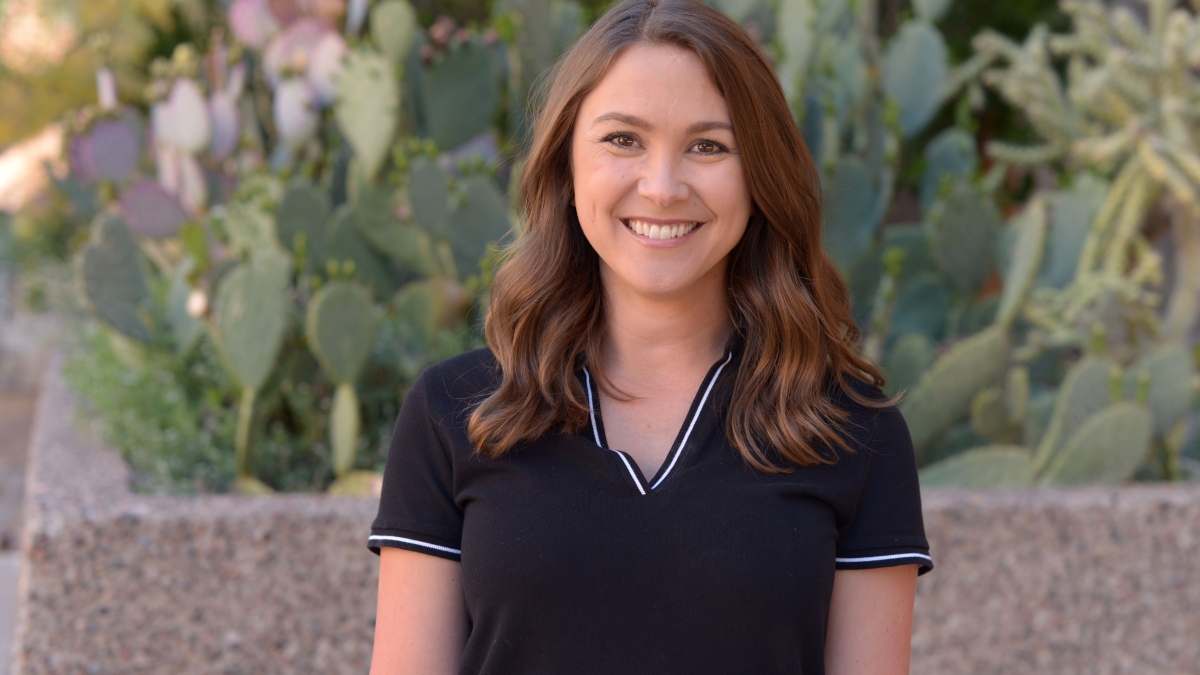NSF CAREER award supports research to improve student mental health

Kately Cooper is a biology education researcher whose work seeks to understand the relationship between biology learning environments and undergraduate and graduate student mental health.
Assistant Professor Katelyn Cooper, a biology education researcher in Arizona State University’s School of Life Sciences, has recently been awarded a Faculty Early Career Development (CAREER) award from the National Science Foundation.
The prestigious CAREER program identifies the nation’s most promising young faculty members who demonstrate outstanding research, excellence in teaching, and the effective integration of both.
"Being a recipient of the CAREER award on her first submission is a testament to both the quality of her research ideas and her strong research record,” said Sara Brownell, fellow School of Life Sciences professor and director of the Research for Inclusive STEM Education (RISE) Center. “Even as an early career researcher, she is emerging as one of the top biology education researchers in the country and the RISE Center is extremely proud of her successes."
Cooper’s lab focuses on understanding the relationship between biology learning environments and undergraduate and graduate student mental health. The award will support a five-year research program to identify factors of student research experiences that positively and negatively impact mental health, and to develop tools and resources to support students throughout their research experiences.
“Dr. Cooper exemplifies our commitment to life-changing research and to excellence in teaching and mentoring,” said Jennifer Fewell, interim director of the School of Life Sciences. “It is wonderful to see her important work continue with support by the NSF CAREER award.”
Depression rates among both undergraduate and graduate science students continues to rise, and participation in academic research experiences is a previously under-examined factor impacting student mental health.
“This CAREER award is going to allow us to study what aspects of research alleviate and exacerbate students’ depressive symptoms, why this is, and what can be done by both students and mentors to protect mental health,” Cooper said.
Most researchers and educators agree that hands-on immersive research is one of the most lucrative experiences students can engage in. Engaging in research equips students with problem-solving, professional development and communication skills. However, science is also a highly competitive field, infamously characterized by repeated failure, which can lead to doubt and negative self-talk.
“My research group has found that there are wonderful aspects of research, such as establishing positive relationships with lab mates and feeling like you belong in the scientific community, and those aspects can be really protective against depressive symptoms,” Cooper said. “But research can also cause you to feel really isolated, experience harsh criticism and doubt what you’re capable of, which in turn can exacerbate depressive symptoms.”
A better understanding of the correlation between these experiences and student mental health will allow institutions to structure research experiences that maximize student mental health, while also equipping students with the tools and resources to better navigate common challenges and stumbling blocks in science.
The project is split into two major components — a national study of undergraduate and graduate researchers and their experiences with depression in the context of research. Data gathered during the study will then be used to develop single-session interventions designed to help students develop effective coping strategies for challenges commonly encountered in research.
Similar interventions have proved highly successful in K–12 students, and Cooper is excited to explore their potential to assist in higher education as well. These sessions will be combined with recommendations for mentors about how to support students and open conversations to further help students who find themselves struggling.
“It’s very encouraging that research experiences can be structured to maximize student mental health,” Cooper said.
She explained that even simple adjustments such as adding more structure, increasing face-to-face time or assigning additional mentors can be really effective in dampening depressive symptoms.
“This is something I’m really passionate about,” she said.
Funds from the award will also support new programs to further integrate research and teaching. Cooper will develop and teach course-based undergraduate research experiences (CUREs) that build on the work conducted in the overall project. These CUREs in biology education will be available to ASU Online students, providing hands-on research opportunities for many students who have never been involved in such projects.
“My excitement is two-fold: I’m excited to engage students in mental health research at scale, and I’m really excited to engage our online students who bring such diverse, important perspectives to this work,” Cooper said.
“I’m extremely grateful that this CAREER award is going to allow me to continue to do that, because I think that it’s really going to strengthen the quality of the research that we’re doing on undergraduate and graduate mental health in biology.”
More Science and technology

ASU-led space telescope is ready to fly
The Star Planet Activity Research CubeSat, or SPARCS, a small space telescope that will monitor the flares and sunspot activity…

ASU at the heart of the state's revitalized microelectronics industry
A stronger local economy, more reliable technology, and a future where our computers and devices do the impossible: that’s the…

Breakthrough copper alloy achieves unprecedented high-temperature performance
A team of researchers from Arizona State University, the U.S. Army Research Laboratory, Lehigh University and Louisiana State…

